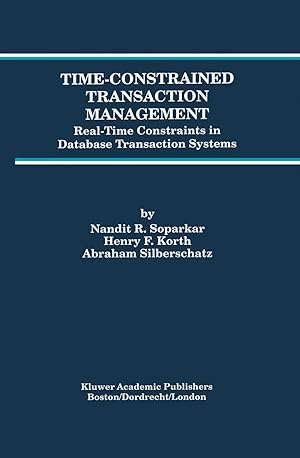time constrained transaction management real time von soparkar nandit (7 Ergebnisse)
Suchfilter
Produktart
- Alle Product Types
- Bücher (7)
- Magazine & Zeitschriften (Keine weiteren Ergebnisse entsprechen dieser Verfeinerung)
- Comics (Keine weiteren Ergebnisse entsprechen dieser Verfeinerung)
- Noten (Keine weiteren Ergebnisse entsprechen dieser Verfeinerung)
- Kunst, Grafik & Poster (Keine weiteren Ergebnisse entsprechen dieser Verfeinerung)
- Fotografien (Keine weiteren Ergebnisse entsprechen dieser Verfeinerung)
- Karten (Keine weiteren Ergebnisse entsprechen dieser Verfeinerung)
- Manuskripte & Papierantiquitäten (Keine weiteren Ergebnisse entsprechen dieser Verfeinerung)
Zustand Mehr dazu
- Neu (5)
- Wie Neu, Sehr Gut oder Gut Bis Sehr Gut (Keine weiteren Ergebnisse entsprechen dieser Verfeinerung)
- Gut oder Befriedigend (1)
- Ausreichend oder Schlecht (Keine weiteren Ergebnisse entsprechen dieser Verfeinerung)
- Wie beschrieben (1)
Einband
Weitere Eigenschaften
- Erstausgabe (Keine weiteren Ergebnisse entsprechen dieser Verfeinerung)
- Signiert (Keine weiteren Ergebnisse entsprechen dieser Verfeinerung)
- Schutzumschlag (Keine weiteren Ergebnisse entsprechen dieser Verfeinerung)
- Angebotsfoto (4)
Sprache (1)
Preis
- Beliebiger Preis
- Weniger als EUR 20 (Keine weiteren Ergebnisse entsprechen dieser Verfeinerung)
- EUR 20 bis EUR 45 (Keine weiteren Ergebnisse entsprechen dieser Verfeinerung)
- Mehr als EUR 45
Gratisversand
- Kostenloser Versand nach USA (Keine weiteren Ergebnisse entsprechen dieser Verfeinerung)
Land des Verkäufers
Verkäuferbewertung
-
Time-Constrained Transaction Management. Real-Time Constraints in Database Transaction Systems.
Anbieter: Antiquariat Bookfarm, Löbnitz, Deutschland
EUR 67,15
Währung umrechnenEUR 16,00 für den Versand von Deutschland nach USAAnzahl: 1 verfügbar
In den WarenkorbHardcover. 155 S. Ehem. Bibliotheksexemplar mit Signatur und Stempel. GUTER Zustand, ein paar Gebrauchsspuren. Ex-library with stamp and library-signature. GOOD condition, some traces of use. 9780792397526 Sprache: Englisch Gewicht in Gramm: 550.
-
Time-Constrained Transaction Management: Real-Time Constraints in Database Transaction Systems (Advances in Database Systems, 2)
Anbieter: Ria Christie Collections, Uxbridge, Vereinigtes Königreich
EUR 111,51
Währung umrechnenEUR 13,78 für den Versand von Vereinigtes Königreich nach USAAnzahl: Mehr als 20 verfügbar
In den WarenkorbZustand: New. In.
-
Time-Constrained Transaction Management: Real-Time Constraints in Database Transaction Systems (Advances in Database Systems)
Anbieter: Ria Christie Collections, Uxbridge, Vereinigtes Königreich
EUR 115,65
Währung umrechnenEUR 13,78 für den Versand von Vereinigtes Königreich nach USAAnzahl: Mehr als 20 verfügbar
In den WarenkorbZustand: New. In.
-
Time-Constrained Transaction Management: Real-Time Constraints in Database Transaction Systems
Anbieter: moluna, Greven, Deutschland
EUR 115,20
Währung umrechnenEUR 48,99 für den Versand von Deutschland nach USAAnzahl: Mehr als 20 verfügbar
In den WarenkorbGebunden. Zustand: New.
-
Time-Constrained Transaction Management : Real-Time Constraints in Database Transaction Systems
Anbieter: AHA-BUCH GmbH, Einbeck, Deutschland
EUR 112,77
Währung umrechnenEUR 61,27 für den Versand von Deutschland nach USAAnzahl: 1 verfügbar
In den WarenkorbTaschenbuch. Zustand: Neu. Druck auf Anfrage Neuware - Printed after ordering - Transaction processing is an established technique for the concurrent and fault tolerant access of persistent data. While this technique has been successful in standard database systems, factors such as time-critical applications, emerg ing technologies, and a re-examination of existing systems suggest that the performance, functionality and applicability of transactions may be substan tially enhanced if temporal considerations are taken into account. That is, transactions should not only execute in a 'legal' (i.e., logically correct) man ner, but they should meet certain constraints with regard to their invocation and completion times. Typically, these logical and temporal constraints are application-dependent, and we address some fundamental issues for the man agement of transactions in the presence of such constraints. Our model for transaction-processing is based on extensions to established mod els, and we briefly outline how logical and temporal constraints may be ex pressed in it. For scheduling the transactions, we describe how legal schedules differ from one another in terms of meeting the temporal constraints. Exist ing scheduling mechanisms do not differentiate among legal schedules, and are thereby inadequate with regard to meeting temporal constraints. This provides the basis for seeking scheduling strategies that attempt to meet the temporal constraints while continuing to produce legal schedules.
-
Time-Constrained Transaction Management : Real-Time Constraints in Database Transaction Systems
Anbieter: Buchpark, Trebbin, Deutschland
EUR 84,45
Währung umrechnenEUR 105,00 für den Versand von Deutschland nach USAAnzahl: 2 verfügbar
In den WarenkorbZustand: Gut. Zustand: Gut | Sprache: Englisch | Produktart: Bücher.
-
Time-Constrained Transaction Management : Real-Time Constraints in Database Transaction Systems
Anbieter: AHA-BUCH GmbH, Einbeck, Deutschland
EUR 158,88
Währung umrechnenEUR 62,02 für den Versand von Deutschland nach USAAnzahl: 2 verfügbar
In den WarenkorbBuch. Zustand: Neu. Neuware - Transaction processing is an established technique for the concurrent and fault tolerant access of persistent data. While this technique has been successful in standard database systems, factors such as time-critical applications, emerg ing technologies, and a re-examination of existing systems suggest that the performance, functionality and applicability of transactions may be substan tially enhanced if temporal considerations are taken into account. That is, transactions should not only execute in a 'legal' (i.e., logically correct) man ner, but they should meet certain constraints with regard to their invocation and completion times. Typically, these logical and temporal constraints are application-dependent, and we address some fundamental issues for the man agement of transactions in the presence of such constraints. Our model for transaction-processing is based on extensions to established mod els, and we briefly outline how logical and temporal constraints may be ex pressed in it. For scheduling the transactions, we describe how legal schedules differ from one another in terms of meeting the temporal constraints. Exist ing scheduling mechanisms do not differentiate among legal schedules, and are thereby inadequate with regard to meeting temporal constraints. This provides the basis for seeking scheduling strategies that attempt to meet the temporal constraints while continuing to produce legal schedules.







